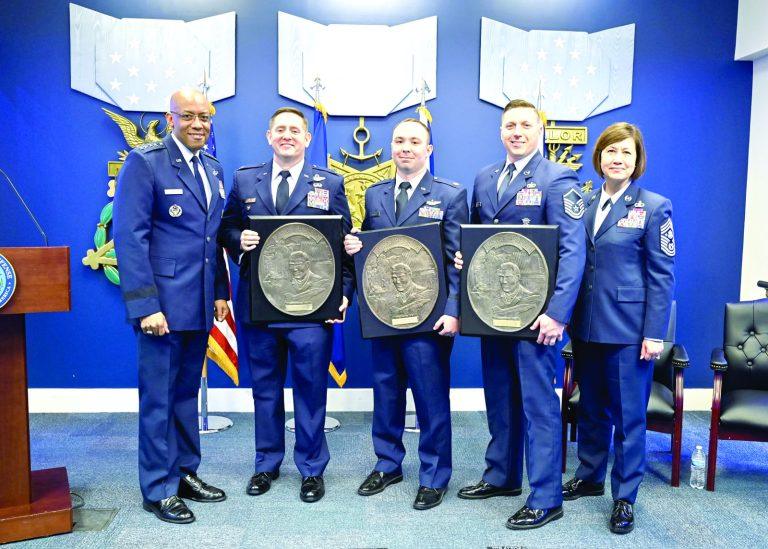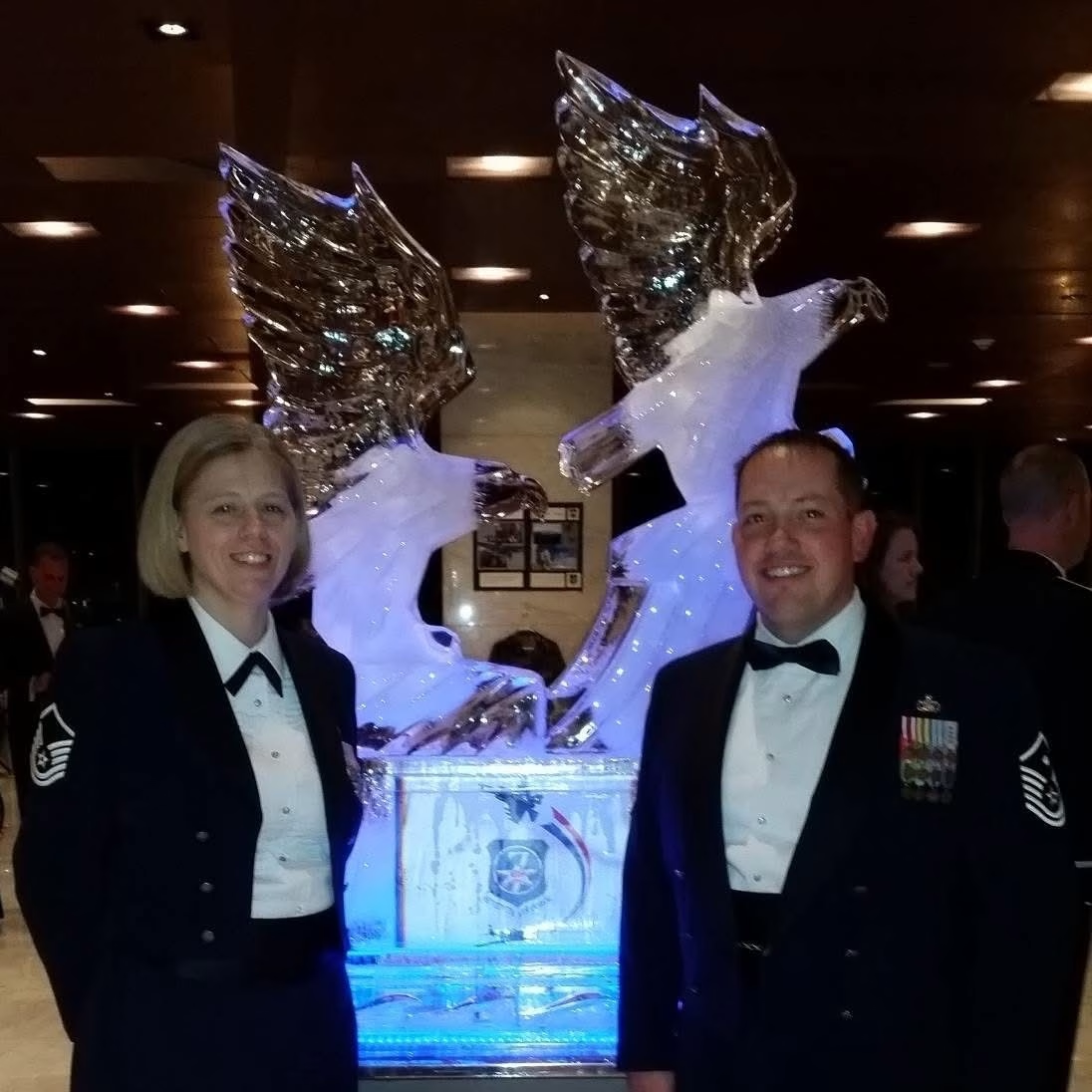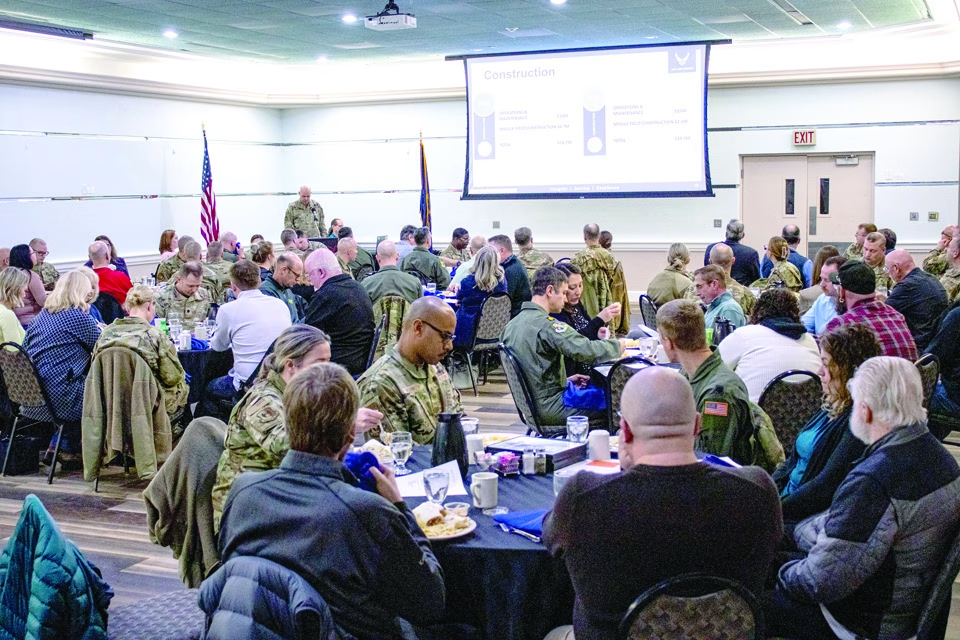The Air Force recognized the Lance P. Sijan Leadership Award recipients from 2019 to 2022 during an award ceremony at the Pentagon, Arlington, Virginia, April 3.
Air Force Chief of Staff Gen. CQ Brown, Jr., spoke about the prestigious award, highlighting the accomplishments of the Airmen who embody Sijan’s leadership and character in performance and standards of personal conduct.
“Your acts of courage and inspirational leadership is why we are all here today,” Brown said during the ceremony. “You carry on a legacy of courage, resilience and dedication to duty that Capt. Sijan stood for.”
The ceremony received a special legacy tribute as Sijan’s younger sister Janine Sijan attended the event and accompanied Brown with the presentation of the awards.
“I thank you all so much from Sijans’ past, present and future” Sijan said to the recipients. “You’re my new family.”
An Air Force Academy graduate and combat pilot, Capt. Lance P. Sijan was the first Air Force Academy graduate to receive the Medal of Honor, awarded posthumously, for his bravery and courage while evading capture and during captivity as a prisoner of war in Vietnam.
The 2019 award recipients:
Col. Carl F. Miller, Air Combat Command, distinguished himself while leading the combat advisory mission for a squadron of 20 joint and combined air advisors operating a fleet of 69 aircraft. He led the program execution and fielding of ten AC-208 aircraft, providing the first organic intelligence, surveillance and reconnaissance, and low-yield, precision-strike capability for the Afghan Air Force.
Maj. Justin L. Burrier, Air Force Special Operations Command, saved the lives of six aircrew and a $98 million aircraft after experiencing a catastrophic dual-engine failure. He also directed two large-force exercises as AFSOC’s lead planner, including U.S. Special Operations Command’s largest exercise in history with over 60 aircraft and 2,500 personnel.
Master Sgt. (retired) Michael J. Hurley, Air Education and Training Command, directed security operations for 98 military and civilian personnel during 16 indirect fire rocket attacks, securing 250 aircraft. He also validated a $4 million contract to integrate 36 civilian security guards into airfield defense and led security operations for the first joint airshow at Keesler Air Force Base, Mississippi.
Master Sgt. Jeffrey B. Fitzgerald, Air Force Global Strike Command, was instrumental to the rebirth of the 91st Security Forces Group’s Tactical Response Force at Minot Air Force Base, North Dakota, which vetted 1,000 defenders for AFGSC. He also authored two chapters in the first-ever Security Force Nuclear Doctrine.
The 2020 award recipients:
Lt. Col. Steven M. K. Cooper, Air Force Special Operations Command, commanded a 525-person multi-national joint task force that spanned over five countries. His efforts eliminated terrorist safe havens within a 500-square mile radius.
Maj. Kasey Vaughn, Air Force Special Operations Command, led a team of intelligence specialists supporting joint task force operations, and directed advanced digital forensics research and development for commercial and government applications for next-generation capabilities.
Senior Master Sgt. Jeremy D. Mapalo, U.S. Air Forces in Europe, led 78 warfighters while defending a nine-hour attack on Magogoni Airfield against 30 Al-Shabaab fighters. His actions allowed a joint-operator ambush that secured one missing soldier.
Master Sgt. Trevor J. Runyan, U.S. Air Forces in Europe, coordinated a reaction task for an urgent battlefield mass casualty evacuation, saving the lives of 30 coalition service members. He also oversaw the treatment of four special operations forces teams, treating 48 joint and Afghan partners.
The 2021 award recipients:
Lt. Col. Nicholas R. Wabeke, Air Force Special Operations Command, led 200 Air Force and Army members to provide security and airfield management ensuring the success of three aviation organizations. His efforts enabled 2,000 missions with over 36,000 hours and included a successful hostage rescue and the retrograde of American forces from Somalia.
Capt. Charles E. Aly, Air Combat Command, led more than 200 personnel from 12 Air Force Specialty Codes that enabled the rapid deployment capability of Immediate Response Forces. In addition, as the deployed director of operations at Air Base 201, Niger, he oversaw more than 150 personnel and over 30 programs supporting Operation Juniper Shield.
Chief Master Sgt. Jefferey J. Brown, Air Force Global Strike Command, led 291 military and civilian personnel while accomplishing 3,000 job orders, and his leadership was vital to sustaining 2,500 facilities and 27 aircraft at Minot Air Force Base. He also led 124 members and oversaw the successful completion of 6,000 jobs while deployed to Kuwait.
Tech. Sgt. Jennifer H. Weigl, Air Education and Training Command, led the Department of Defense’s largest microbiology department and managed a $5.2 million equipment account while supervising 63 joint military members. She also fortified the Air and Space Force’s Basic Military Training mission by shifting 110,000 Coronavirus tests to Brooke Army Medical Center, averting a $1 billion training platform pause.
The 2022 award recipients:
Lt. Col. Morgan H. Laird, Air Force Special Operations Command, commanded forces assigned to the joint tactical exfiltration of Bagram Air Base, Afghanistan, that ensured the last 727 joint service members safely collapsed security and boarded 15 aircraft to depart. He led his squadron through three crisis response deployments, evacuating 1,100 American citizens and safeguarding a U.S. embassy.
Capt. Christopher T. Locke, U.S. Air Forces in Europe, was selected to lead one of five evacuee camps during Operations Allies Refuge at Ramstein Air Base, Germany. He managed 1,000 joint service members supporting a camp with over 9,000 Afghans.
Senior Master Sgt. Karla J. Pelavo, Air Combat Command, led nearly 600 Airmen and directed the largest logistics hub supporting operations Inherent Resolve, Spartan Shield and Enduring Sentinel. Her leadership was critical during the historic non-combatant evacuation of more than 57,000 personnel from Afghanistan directly supporting Operation Allies Refuge.
Tech. Sgt. Connor J. Hamilton, Air Combat Command, led nine joint teams and 50 members during Operation Inherent Resolve and Allied Refuge. He equipped senior leaders with courses of action that resecured Hamid Karzai International Airport enabling history’s largest evacuation of 124,000 refugees. He also led a combatant command planning group fusing State Department and military strategy deploying 1,000 warfighters to rescue 5,000 personnel.













